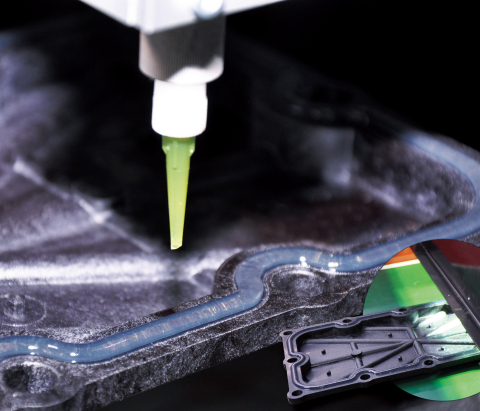SHANGHAI--()--Henkel has expanded its gasketing technology portfolio with new materials and processes designed to replace rubber gaskets in demanding automotive applications. With its latest development – the Loctite® 5883™ polyacrylate gaskets combined with the new XIP gasketing process. Henkel provides its customers with a unique sealing solution – a solution that allows them to dispense high-performance compression gaskets within seconds, directly onto automotive parts. This new process eliminates the need for solid rubber press-in-place (PIP) gaskets and enables automotive OEMs and tiered suppliers to enhance the performance and reliability of their products while achieving productivity goals and reducing overall costs.
The automotive industry is constantly shifting with evolving performance and higher efficiency standards, driven by emerging end-user requirements and stricter environmental regulations. This pattern translates into new product design challenges, which the automotive designers have to seek solutions for.
The use of light weight materials such as plastic materials has been the common response from the industry to achieve fuel efficiency and sustainability goals. Engines, Heating, Ventilation and Air-Conditioning (HVAC) modules and electronics components integrate an increasing number of plastic parts such as covers or header tanks, which have to be sealed to the core component unit. The most commonly used plastic-to-substrate sealing method is the press-in-place (PIP) process, whereby the solid rubber gasket or o-ring is manually applied onto the parts. With this process comes a risk of displacement of the gasket during compression, leading to rework or leakages.
Milestone in the automotive industry
With the introduction of the XIP gasket technology, Henkel allows the fast, precise and series production-ready dispensing of a liquid gasket directly onto automotive parts, replacing the PIP method. The dispensed liquid material is cured by ultraviolet light within seconds. The output is a perfectly uniform solid compression gasket, with a constant height and perfect start and stop points. These features are enabled by the volumetric dispensing system offered by the XIP equipment. This reduces the risk of rework and leakages, while improving the productivity and reducing the overall cost by automating the gasketing process and eliminating the inventory as well as the complexity of the PIP solid gaskets.
The new Loctite® 5883™ coupled with the new high-precision XIPG gasketing process marks a milestone in chemical and process development in the automotive industry, delivering benefits for fast and efficient manufacturing, fuel efficiency and sustainability.
To learn more about Loctite New Performance Gasketing, please visit the Henkel website at: www.henkel.asia/autogasket.
Photo material is available at http://www.henkel.com/press.
Henkel operates worldwide with leading brands and technologies in three business areas: Laundry & Home Care, Cosmetics/Toiletries and Adhesive Technologies. Founded in 1876, Henkel holds globally leading market positions both in the consumer and industrial businesses with well-known brands such as Persil, Schwarzkopf and Loctite. Henkel employs about 47,000 people and reported sales of 15,605 million euros and adjusted operating profit of 2,029 million euros in fiscal 2011. Henkel’s preferred shares are listed in the German stock index DAX and the company ranks among the Fortune Global 500.
Photos/Multimedia Gallery Available: http://www.businesswire.com/cgi-bin/mmg.cgi?eid=50373478&lang=en





